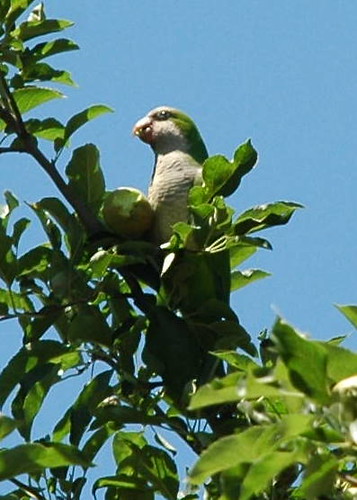
On his Web site, Brooklyn Parrots, Steve Baldwin reports that Brooklyn's most charismatic potentially invasive species, Myiopsitta monachus, Monk Parakeets, have been poached from at least one, possibly two, locations:
Several residents of Marine Park [a neighborhood in southeastern Brooklyn, adjacent to JFK Airport] have approached me recently, asking what happened to their once-thriving colony of wild parrots. I have been able to verify through a source that these parrots have been stolen by thieves. According to this source, two men, one with a long pole, have been taking live parrots from the pole nests in Marine Park. They work at night, and have been seen by residents. If this is the same operation that has stolen parrots in Midwood [a neighborhood south of me], their MO is to sell the parrots to local pet stores for $25 a piece, where they have value not as pets, but as breeding pairs.Baldwin goes on to urge people to report suspicious activity to the police, and to ConEd, the power provider for New York City, since the birds commonly nest around transformers.
He continues:
The Monk Parrots of Brooklyn enjoy no special protections under New York State Law. They are classified, along with pigeons and starlings, as birds that can be "taken" at any time, unlike protected species. They are vulnerable to poaching, and because Quakers are legal in New York, there is a ready market for captured birds.There's a good reason Monk Parakeets are not "protected": they're not native to the United States, let alone Brooklyn. They were introduced, accidentally or deliberately, a few decades ago.
This is an emotional issue. Monk Parakeets are attractive, gregarious (with each other, at least), big, loud birds commonly sold as pets. They've appeared in my backyard, and whenever I see them, I find myself crying out "Parrots!" But make no mistake: Monk Parakeets are a potentially, at least, invasive species. They are reproducing, and spreading, in the wild. Not just in Brooklyn, or the NYC Metropolitan Area, but in over a dozen states.
To get a taste of how emotional this is going to get, read on:
They are considered unworthy [of] protection because they are classified as "introduced." This stigma is equivalent to "illegal alien" in the human world - "introduced" species don't have the same rights, protections, and privileges. When bad things happens to them, society feels free to turn its back. Do the wild parrots of Brooklyn, which have been in the borough for 40 years, have a right not to be captured and sold into captivity? I think so.Sturnus vulgaris, the European Starling mentioned earlier, was deliberately introduced to this continent by Eugene Schiefflin in the 19th century. His "acclimitization" society wanted to introduce all the birds mentioned in the works of Shakespeare. The epicenter for this invasion was in New York City's Central Park. You probably know the rest. They compete with native species for nesting cavities, and have been known to displace the residents of active nests.
Before we get all teary-eyed about the plight of the parrots, we need to understand the impact they've already had, and what will happen as they continue to expand their range. What native species have the parrots already displaced? What species might be able to get re-established, if the parrots were not already here? What ecological niches are they occupying?
I've seen the parrots mobbing and driving off crows, which are twice their size, so I know they can be aggressive towards other birds. I've observed them eating apples from our neighbors' tree, which reaches into our yard. Are there no native fruit-eating birds which could be supported by such bounty? I've never seen them here, but Orioles come to mind. I'd rather see Orioles eating the apples. But that will never happen as long as the parrots are around.
Baldwin also announced that he will be campaigining for protective legislation for the parrots. As much as I am also fond of the little darlings, I will oppose such legislation.
Links:
- My blog entry June 12, 2006 on the First parrot sighting of the season
- Brooklyn Parrots
- Feral Monk Parakeets (Quaker Parakeets) in North America
- Institute for Biological Invasions: Monk Parakeets
- Quaker Parakeet Society
- Wikipedia: Monk Parakeet

1 comment:
Blue Jays and Red Squirrels eat apples here at the farm.
Post a Comment